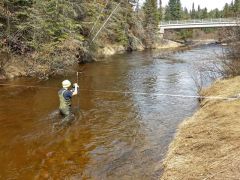Dr. Catherine Eimers (Trent University), Jesse Anderson (Minnesota Pollution Control Agency)
Summary
 In our first webinar of this series, we heard about efforts to establish international water quality objectives aimed at reducing nutrient loads to the Rainy – Lake of the Woods watershed. In today’s webinar, we will hear from two researchers about the science that helps us to better understand how nutrients like phosphorus and nitrogen behave in our lakes and streams and contribute to plant growth, including algae blooms.
In our first webinar of this series, we heard about efforts to establish international water quality objectives aimed at reducing nutrient loads to the Rainy – Lake of the Woods watershed. In today’s webinar, we will hear from two researchers about the science that helps us to better understand how nutrients like phosphorus and nitrogen behave in our lakes and streams and contribute to plant growth, including algae blooms.
To date, much of the nutrient remediation work in Rainy – Lake of the Woods has focused on trying to control phosphorus, a key driver of algae growth that is plentiful in this system. However, other nutrients such as nitrogen can also contribute in important and complex ways to making blooms more harmful. In this webinar, Dr. Catherine Eimers and Jesse Anderson will make the case for considering nitrogen in our monitoring efforts, drawing on data from Canada (Environment and Climate Change Canada and Trent University) and the US (Minnesota Pollution Control Agency) for seven tributaries that drain into the Rainy River.
Please join us for this fascinating glimpse into active science from our watershed. There will be opportunities to ask questions of the presenters, so please bring your curiosity! Note that the session will be recorded for rebroadcast to the LOWWSF website.
About the Presenters:
 Jesse Anderson is a research scientist with the Minnesota Pollution Control Agency. For over twenty years, Jesse has been a major player in the MPCA’s monitoring and research in the Rainy-Lake of the Woods watershed. Examples include the detailed studies leading to publication of the Lake of the Woods Monitoring and Assessment Report in 2016 and the development of the Lake of the Woods TMDL Report outlining ways to maintain or improve water quality to address the State’s listing of the lake as impaired. Jesse’s impact extends beyond Lake of the Woods, including assessments of the Little Fork and Big Fork rivers, participation in the National Lakes Assessment Project, Sentinel Lakes monitoring and the MPCA’s Intensive Watershed Monitoring Program.
Jesse Anderson is a research scientist with the Minnesota Pollution Control Agency. For over twenty years, Jesse has been a major player in the MPCA’s monitoring and research in the Rainy-Lake of the Woods watershed. Examples include the detailed studies leading to publication of the Lake of the Woods Monitoring and Assessment Report in 2016 and the development of the Lake of the Woods TMDL Report outlining ways to maintain or improve water quality to address the State’s listing of the lake as impaired. Jesse’s impact extends beyond Lake of the Woods, including assessments of the Little Fork and Big Fork rivers, participation in the National Lakes Assessment Project, Sentinel Lakes monitoring and the MPCA’s Intensive Watershed Monitoring Program.
In addition to his research and collaboration record, Jesse was recognized for his leadership in organizing the publication of a special issue on Lake of the Woods in the Journal of Lake and Reservoir Management, bringing together a broad team of researchers and making the science available to the world.
 Dr. Catherine Eimers is a Professor in the School of the Environment at Trent University in Peterborough, ON where she serves as the Program Coordinator of Water Sciences and Associate Director, Trent School of the Environment. Her research focuses on the relationships between changes in climate, hydrology and water quality.
Dr. Catherine Eimers is a Professor in the School of the Environment at Trent University in Peterborough, ON where she serves as the Program Coordinator of Water Sciences and Associate Director, Trent School of the Environment. Her research focuses on the relationships between changes in climate, hydrology and water quality.
